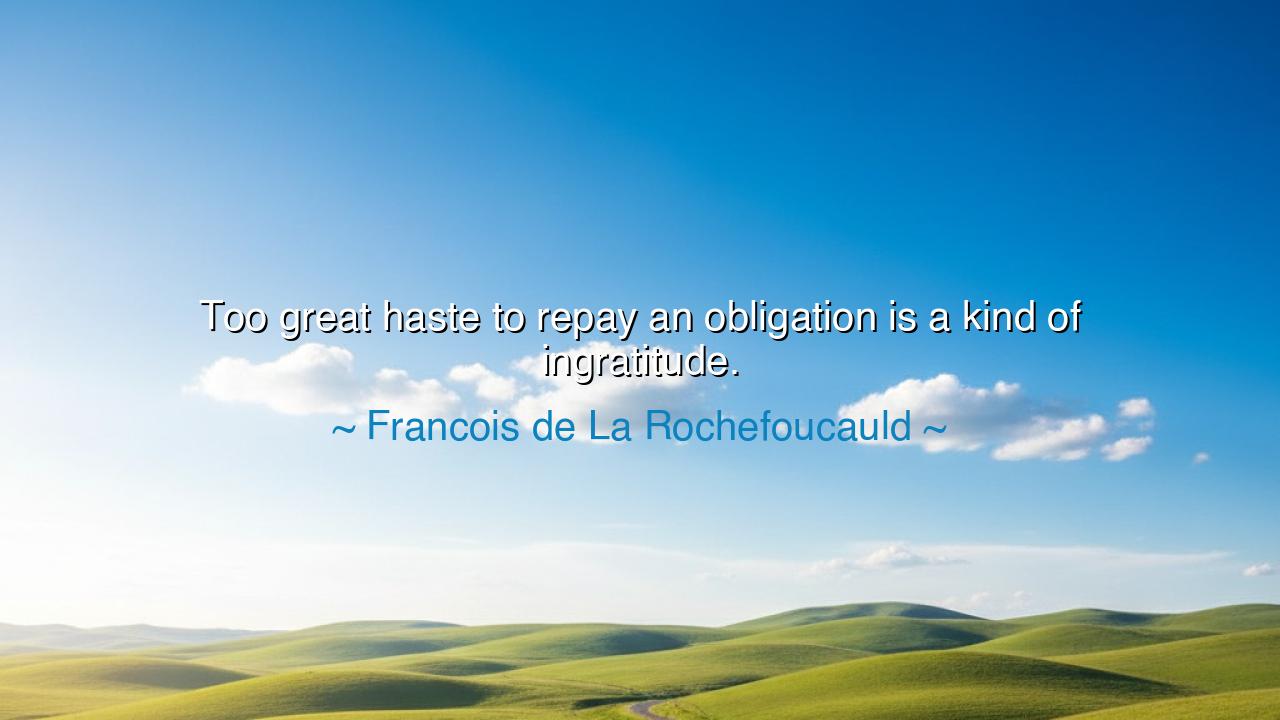
Too great haste to repay an obligation is a kind of ingratitude.






“Too great haste to repay an obligation is a kind of ingratitude.” Thus spoke François de La Rochefoucauld, the sharp-souled moralist of seventeenth-century France, whose wisdom pierced the vanities and subtleties of human nature like an arrow through silk. In this reflection, he touches upon a truth both delicate and profound — that gratitude, when rushed, can lose its sincerity, and that the anxious desire to repay kindness too quickly may conceal not virtue, but pride. His words are a mirror held to the heart, showing that even our noblest impulses, if tainted by self-concern, can drift far from true goodness.
La Rochefoucauld lived in an age of elegance and intrigue, a courtly world where every gesture carried layers of meaning. In such a world, gratitude was often bound to power and reputation — favors were exchanged not merely out of kindness, but out of calculation. Yet, the philosopher saw deeper than the glittering surface. He understood that real gratitude is not a transaction, but a communion of spirits. It is not measured by the swiftness of repayment, but by the depth of acknowledgment — by the humility of receiving, the patience of remembrance, and the sincerity of the heart. When one rushes to repay, it is often not to honor the giver, but to free oneself from the debt — to restore independence and avoid the discomfort of feeling beholden. And in that haste lies a subtle form of ingratitude, for it denies the grace of genuine appreciation.
To the ancients, this teaching would have resonated deeply. The Stoics taught that virtue lies not in outward action alone, but in the purity of intent. To accept a gift or favor with honor, to hold it in one’s memory with respect and affection — this, they said, was the soul of thankfulness. The man who scrambles to return a favor too soon, they warned, often does so to erase his own sense of vulnerability. He is not moved by love, but by pride. He seeks not to bless the giver, but to liberate himself from the feeling of obligation. True gratitude, by contrast, is patient. It rests not in repayment, but in relationship — in the quiet, enduring recognition of kindness received.
Consider the tale of Cicero and Caesar, two giants of ancient Rome. When Julius Caesar once defended Cicero’s political honor before the Senate, Cicero — ever proud, ever conscious of appearances — hastened to repay him with a flowery speech of praise, declaring that he could never forget the favor. Yet historians tell us that Caesar, seeing through the flattery, smiled faintly and said, “You repay too quickly, my friend; therefore, I fear you will not remember.” In time, Cicero’s allegiance did indeed waver. Caesar’s insight was the same as La Rochefoucauld’s: haste in repayment may mask not gratitude, but a desire to close the ledger, to end the bond of kindness before it deepens into true loyalty.
There is a moral subtlety here that requires a wise heart to perceive. For gratitude, when it is genuine, has no need of haste. It endures quietly, even when the debt can never be repaid. It finds joy not in equality, but in remembrance. The parent who raises a child does not seek repayment; the teacher who shapes a mind asks only that the wisdom be carried forward. The true response to kindness is not repayment but continuation — to let the light that was given to us shine outward into the lives of others. Thus, the soul that is truly grateful becomes not a debtor, but a vessel of generosity, allowing goodness to flow through it as a river flows through valleys without seeking return.
La Rochefoucauld’s insight, then, is not a condemnation of gratitude, but a refinement of it. He reminds us that even virtue can wear the mask of vanity. The hasty repayment of an obligation can be an attempt to reclaim superiority — to prove to ourselves that we owe nothing, that we stand equal or above. But true gratitude humbles us; it teaches us to dwell in the beauty of dependence, to recognize that our lives are interwoven with others. To rush to sever that bond is to reject the humility that gratitude demands.
So, my friend, let this be your lesson: when kindness is shown to you, do not rush to balance the scales. Sit with it. Reflect upon it. Let the feeling of gratitude take root in your heart. Repay not with speed, but with sincerity. Return not only the favor, but the spirit in which it was given — with warmth, respect, and the patience of remembrance. For gratitude that endures in silence is more noble than repayment that clamors for attention.
And remember, as La Rochefoucauld teaches, the truest gratitude is not the one that seeks to end the obligation, but the one that cherishes it — that carries the gift as a living bond between souls. In this, there is no debt, only grace; no burden, only beauty. Thus, when you are blessed by another’s kindness, let your thanks be not a transaction, but a testament — a quiet, enduring flame that honors the giver, long after the gift has passed.






AAdministratorAdministrator
Welcome, honored guests. Please leave a comment, we will respond soon